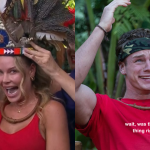
This morning, Sunrise went some way towards making up for its atrocious segment on Indigenous child removals last week with a longer piece, gathering a panel of Indigenous experts to talk about the highly complex issue.
Sam Armytage, who hosted the original and widely criticised segment, wasn’t part of it. Instead, David Kochie hosted the 10-minute chat between CEO of a Darwin‘s Danila Dilba Health Service Olga Havnen, Indigenous health researcher Dr. James Ward, and Aboriginal Health CEO Pat Turner.
While his introduction didn’t include an apology (and Channel 7 has yet to issue one), it did acknowledge that the issue deserved a lot more care and attention than previously given, and mentioned the protests Sunrise had taken great lengths to hide last week.
“We bring you a special edition of Hot Topics, taking a closer look at the complex and very emotional issue of child protection, particularly in Indigenous communities,” he said.
“The topic was raised on the front page of the Courier Mail last week, where the assistant federal minister for children, David Gillespie, suggested he wanted to relax rules around abused Aboriginal children being placed with relatives.
“We know it’s a conversation around Aboriginal children and their removal sparked concern and protests last week, so we’re responding to calls by the Aboriginal community to look at the issue with the experts. So we’ve got the experts this morning.”
Kochie started things off by asking Havnen to explain the process of taking an Aboriginal child from their home, something the Sunrise segment got spectacularly wrong last week.
“Normally, the process would be a notification, followed by investigation, and if substantiation of serious harm or abuse, then the likelihood is that young person would be removed from their family,” she explained.
However, all the panellists agreed that child removal was not the solution to a widely complex problem, and that greater funding for support systems was absolutely needed.
“The other thing people need to understand is that not all communities are in this sort of state of crisis or disfunction that sometimes the media would lead us to believe,” continued Havnen. “There’s always a level of vulnerability, we acknowledge that, and sometimes the biggest problem probably has more to done with family violence, overcrowding, and alcohol issues, so if we could deal with some of those problems I suspect you’d find that the welfare and wellbeing of our families would be a whole lot better off.”
“It’s about time government at all levels listened to what our sector has been saying,” said Turner, outlining a holistic, early intervention family support services that would support both traumatised kids and their families.
“I’ve worked in Aboriginal Affairs all my life. The thing is that government is not listening, full stop. There’s plenty of money. There’s plenty of money to spend on defence, there’s plenty of money to spend on border security. Let’s fix up this issue which is a national shame for this country.”
Ward took specific aim at the media for conflating high STI rates among young Aboriginal people and child sexual abuse.
He explained that while there is a high rate of STIs diagnosed in people under the age of 16, most are among people aged 13 to 15 who are having sex with their same-age peers. Very few cases – alarmingly though they are – are linked to child sexual abuse, with about five cases in total last year.
“The reporting about children diagnosed with STIs under the age of 16 should be removed, is probably very much irresponsible and insensitive, and to link it to another Stolen Generation is outright irresponsible reporting,” he said. “What it does it drive those young people further away from the healthcare services where we’re trying to get those young people in for care and for attention.”
At one point, Kochie even referenced Prue MacSween‘s outrageous comment last week that widespread removal of Indigenous children would be a “no brainer”, which raised eyebrows across the panel.
Havnen floated the idea of a confidential helpline to support very vulnerable children, Kochie replied: “That sounds like a really simple solution, that almost sounds like a no brainer.”
Indeed.
As Kochie was wrapping things up, Havnen asked to make one final comment.
“I think you’re absolutely right, what we need is intelligent, informed discussion and looking for solutions rather than the confected outrage and anger,” she said.
“Yep, absolutely, on all sides,” Kochie agreed, which is possibly the closest we’ve gotten to an apology so far.
The make-up segment has been well-received on social media, if slightly dampened by the fact that a protest outside the studio this morning was prevented from appearing on Sunrise by NSW Police officers outside.
Coppers have barricaded public walkway to block protesters from protesting st #Sunrise7 Windows @sunriseon7 pic.twitter.com/lolXpdn86y
— Elizabeth (no blue tick) Wymarra 😂 (@woollogirl) March 19, 2018
That’s a No Brainer says Kochie hearing the solution to Child Protection from experts on breakie TV. Investing in support services is key & not misinformed debate they say. Onya #Sunrise7 now back to #Jarjums @NITV pic.twitter.com/yhMTLJPkAe
— Tanya Denning Orman (@TanyaDenning) March 19, 2018
I set an alarm so I wouldn’t miss it and tuned in to #Sunrise7 this morning, to see Indigenous leaders and experts @NACCHOAustralia It was great to see rational, informed, educated discussion on a morning tv show for once. Well done NACCHO 👌🏽
— Dr Amy Thunig (@AmyThunig) March 19, 2018
https://twitter.com/CharleeSueFrail/status/975825039529426944
The peak NSW Aboriginal body tweeted afterwards that while they’re “still waiting for an apology from Sunrise”, it was “a step forward to see three Aboriginal experts on the panel this morning.”
We’re still waiting on an apology from Sunrise… but it was a step forward to see 3 Aboriginal experts on the panel this morning. “It’s about time that governments at all levels listen to our communities,” said Pat Turner, CEO of @NACCHOAustralia. We agree. https://t.co/0gY0b8bjUR
— AbSec (@AbSecNSW) March 19, 2018
And Armytage – who also has yet to apologise – tweeted afterwards that she “looks forward to having [the panelists] on the show often”.
Great informative, productive chat…thx to our panel today. We look forward to having you on the show often. https://t.co/W0XlXwV4fQ
— Samantha Armytage (@sam_armytage) March 19, 2018
Hopefully that means this will be the last time – at least on Channel 7 – that Indigenous issues are discussed without Indigenous representation.
You can watch the full segment below.



